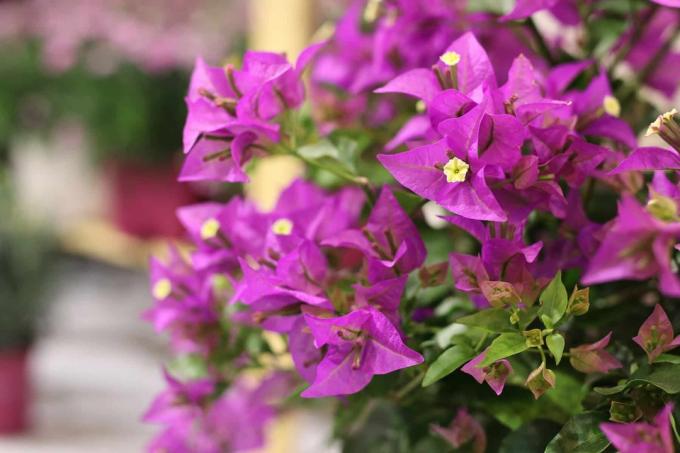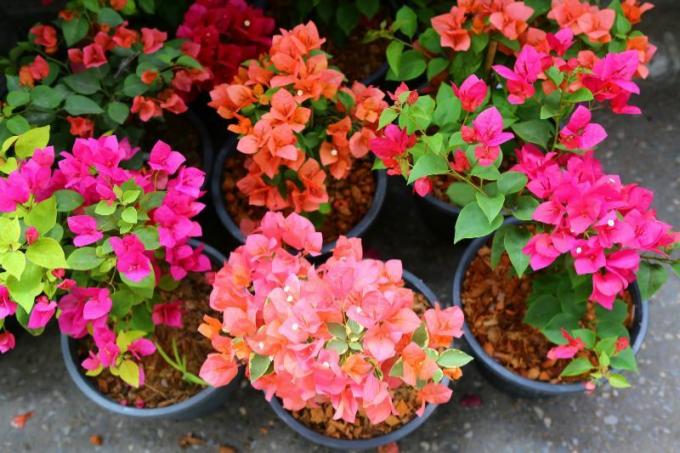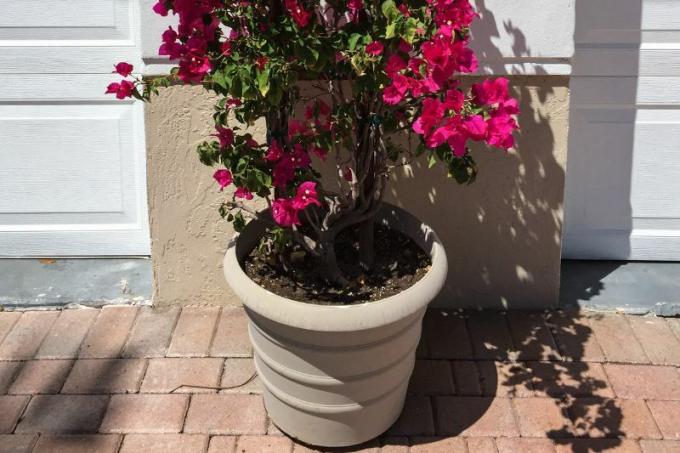
The bougainvillea, which comes from South America and is not hardy, does not tolerate cool temperatures. The plants with the attractive bracts are brought indoors in autumn and overwintered in a suitable, frost-free place.
In a nutshell
- Move to winter quarters when temperature drops to 5°C
- make a strong cut
- bright and cool location
- water moderately
- Check regularly for pests and diseases
Table of contents
- Bougainvillea hardy
- winter quarters
- Care
- frequently asked Questions
Bougainvillea hardy
The Bougainvillea is not a hardy plant and reacts very strongly to cold temperatures. Therefore, the hibernation of the triplet flower should run smoothly. It takes a little more effort to move the triplet to the winter quarters, but you will be rewarded with a lush bloom in the coming season. As soon as temperatures threaten to drop to 10°C, it's time to prepare the plant. At the latest when it is only 5 °C, it has to go to its winter quarters, as it cannot tolerate temperatures below that. Don't wait too long though, as the plant needs a week or two to adjust.

Preparation:
- strong cut (including freshly formed flowers)
- Check shoots for diseases and pests
- Also remove diseased plant parts
- Check the pot for damage and pests
In order for the triplet to survive the winter well, it is important that it does not waste energy unnecessarily. Therefore, you must also consistently new in the winter quarters formed flowers remove.
You can use the pruning to propagate the plant. Ideal are approx. 20 cm long annual shoots that are slightly woody.
winter quarters
A cool but not too cold location is ideal for wintering. If you bring the plant indoors at the end of August, it can grow like a flower at room temperature normal houseplant overwinters become.
If the triplet only comes into the house when it gets cooler, the winter quarters should meet the following requirements:
- at least 10 – 15 °C
- bright, direct sun not necessary
- no direct contact with a cold floor
- Avoid drafts

Stone or tiled floors in particular can become problematic during the winter if they cool down too much. Place the pot on a styrofoam board or wooden board to avoid sharp temperature fluctuations.
Care
The maintenance effort in winter is low. If the plant does not get enough light, it sheds all its leaves. This is not a problem, you should only remove the fallen leaves regularly to prevent diseases and pests. In the spring, the triplet forms leaves again.

Further care measures in winter:
- Keep substrate only slightly moist
- Check regularly for diseases and pests
Small waterings every few weeks are perfectly adequate for most species. Avoid overwatering, as this can promote root rot, especially in plants that have shed their leaves. Excluded from this Bougainvillea spectabilis, because with her the watering is only slightly reduced in winter.

If you have problems with pests such as spider mites, spray the plants lightly. spider mites like a dry environment and through that increased humidity the bugs will go away on their own. A bit more stubborn are scale insects, which can also appear in the bougainvillea in the winter quarters. They are often taken from the wild to their winter quarters. Good prior checking is therefore important. Should still scale insects appear, you can simply scrape it off with a wooden stick. If the infestation is severe, you can spray the plant with a mixture of neem oil.
frequently asked Questions
The move to the open air should take place at the earliest when the temperatures are constantly at least 16 °C. You can get the plants used to moving outdoors earlier and, for example, put them in a bright and warm room a few weeks earlier. The sooner you get the bougainvillea used to higher temperatures, the sooner it will form flowers and attractive bracts.
No, the substrate should be as lean as possible. In the winter quarters, the triplet should not receive any further nutrients, as this would encourage premature new growth. However, the shoots would have too few hours of sunshine to carry out sufficient photosynthesis. This would severely weaken the plant and may even lead to its death.
Yes, as long as the temperature does not fall below 5 °C at night. You should also protect the triplet flower from too high temperatures, otherwise it will form new shoots too early.
